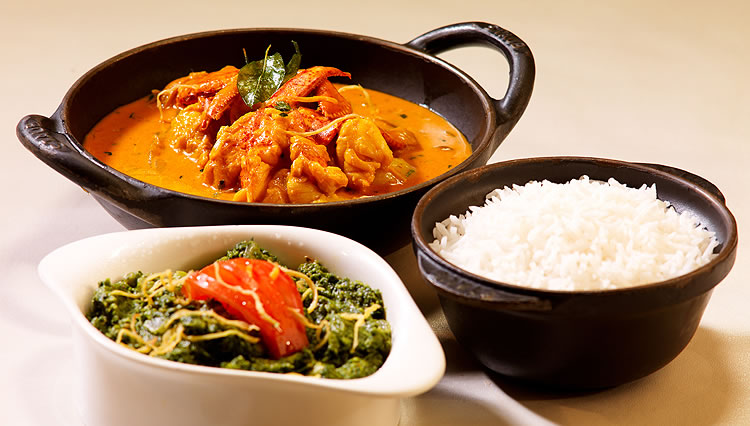Every culture has its eating etiquette, but for Hindus these rules translate into a theology much more intricate and ancient than any western counterpart. Ayurveda is one of the world’s oldest holistic healing systems and stems from a belief in mind-body unity, with sages ascribing the importance of understanding your body and using food to strengthen your mind – as indeed, you are what you eat.
There is a connection between Brahman, ourselves and all other existents that must always be honoured, not just in what we eat but the experience we have while preparing and eating it. Hindu scriptures highlight three important forces that influence a food’s nutritional value: pathrashuddhi, the cleanliness of the cooking vessels, pakashuddhi, the chef’s cleanliness and mental attitude, and pachakashuddhi, the quality of ingredients. Hindus believe that these three shuddhis – or purities – are transmitted and absorbed by the eater. Therefore, in order for a meal to cleanse both the mind and body, the dishes must consist of the freshest ingredients and be prepared with careful consideration and love.
Finding an Indian restaurant that caters to these components can be difficult, as many of the ritualistic elements of preparation have been replaced with more efficient methods. Ayurveda requires commitment and a dedication to preservinga tradition rooted in the natural balance between the individual and wider world – a philosophy not always feasible in our fast paced and modern world.
However, Ayurveda has permeated global cuisines and cultures and continues to influence, inspire and delight those who get to sample such spiritual food. Even for those who do not follow the Hindu religion, the humble principles and pantheistic natural ideology are increasingly appealing to modern diners who are looking to enhance both their mealtimes and lifestyles.
For too long many have treated as eating a mechanical act andas though it were a simple side effect or consequence of existing. We eat walking to work, on buses and behind computer screens, mindlessly ingesting without savouring or even acknowledging the food. Yet individuals are being drawn back to simpler principles, replacing microwave meals with those that have been lovingly prepared. For those hoping to get a taste of this spiritually nourishing cuisine, they need only inject these simple steps come next meal time:
- Eat modestly to aid with digestion.
- Always sit down to eat and eat slowly – savour the dish, relish the favours, aromas and textures. Food is a manifestation of Brahman and should be celebrated.
- Eat quietly, paying attention to each mouthful or have a good conversation.
- Serve fresh food whenever possible.
- Use detoxifying herbs such as triphala, ashwagandha, guggulu, brahmi, ginger, turmeric and neem.
- Live in tune with nature and practise vegetarianism if possible.
- Rest after the meal, enjoy the company and conversation of those around you or listen to relaxing music.
- If eating in the evening, exercise rather than rest. A short walk or amble will aid with digestion and lead to an abundant sleep.
Why not combine this practice with a visit to one of London’s best Indian fine dining restaurants? Here, you can experience the authentic cuisine that goes hand-in-hand with Ayurveda.
